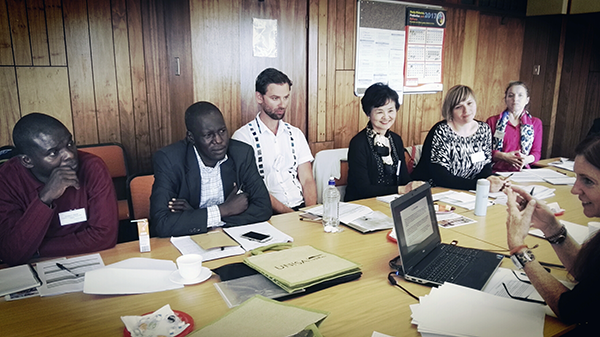College of Human Sciences
Global researchers reflect on families and patterns of care
Families and patterns of care was the theme of the bi-annual research group conference (RC06) of the International Sociological Association (ISA). This conference was co-hosted by the Department of Sociology at Unisa and twenty papers were presented by delegates from different parts of the world including Russia, Mexico, Nigeria and Uganda.
Eldercare received particular attention as many countries in East Asia, Europe and North America are faced with older populations, many of whom are in need of care. Attention was drawn to the fact that categories of older people such as older divorced men, older migrant family members, and couples who lost their only children (in the contexts of the one child policy of China) could not count on family members to look after them when becoming frail or suffer from degenerative diseases. Yet, despite the youthful population on the African continent, the older population in Africa is growing fast and often also without adequate family support as a contribution from Uganda attested.
A highlight was the keynote address by Prof Leila Patel, who holds the Research Chair in Welfare and Social Development at the University of Johannesburg. At the banquet dinner she took the audience on a journey through South African family policy development over the last few decades. She drew attention to the positive outcomes of the child welfare grant that has proven positive effects on children and their families. Such positive research results clearly challenge the public discourse on an imagined dependency on the grants. However, she was critical of the family policy papers that maintain heteronormative middle class families (or nuclear family households) as an ideal type and even part of so-called moral regeneration. Such limited views of families undermine the gains made by LGBTIQ+ activists and ignore the harsh realities of gender based violence (GBV) within families.
Three papers by members of the Department of Sociology at Unisa furthered the social construction of gender within families. Dr Ntokozo Mthembu drew attention to how ilobolo practices prevent poorer men from entering recognised marriages. It was argued that this entrenched custom in present day African societies has positive aspects, such as linking families, but there is also a negative trend of families asking exuberant amounts for ilobolo that prevent marriages from taking place.
Leon Roets showed through his qualitative research that men are on various pathways towards manhood in South Africa. Initiation schools used to play an important role in such journeys of men but commercialisation of some such schools and certain urbanised men being unaccustomed to the initiation school environment make these journeys much more difficult than in the past.
Prof Marlize Rabe revisited the gendered discourse on men as providers amongst the marginalised youth in the City of Tshwane, including homeless and drug addicted youth. Both male and female research participants portray men as the main economic providers, an expectation that due to limited opportunities may result in men resorting to crime. Yet, there is a growing notion amongst women who have been victims of GBV to become economically independent.
*Submitted by Marlize Rabe
Publish date: 2017/05/02


 Unisa co-hosts G20 community outreach in the Eastern Cape
Unisa co-hosts G20 community outreach in the Eastern Cape
 Unisans gain membership of prestigious science academies
Unisans gain membership of prestigious science academies
 Advocating for disability transformation through servant leadership
Advocating for disability transformation through servant leadership
 Unisa Press continues to illuminate the publishing space
Unisa Press continues to illuminate the publishing space